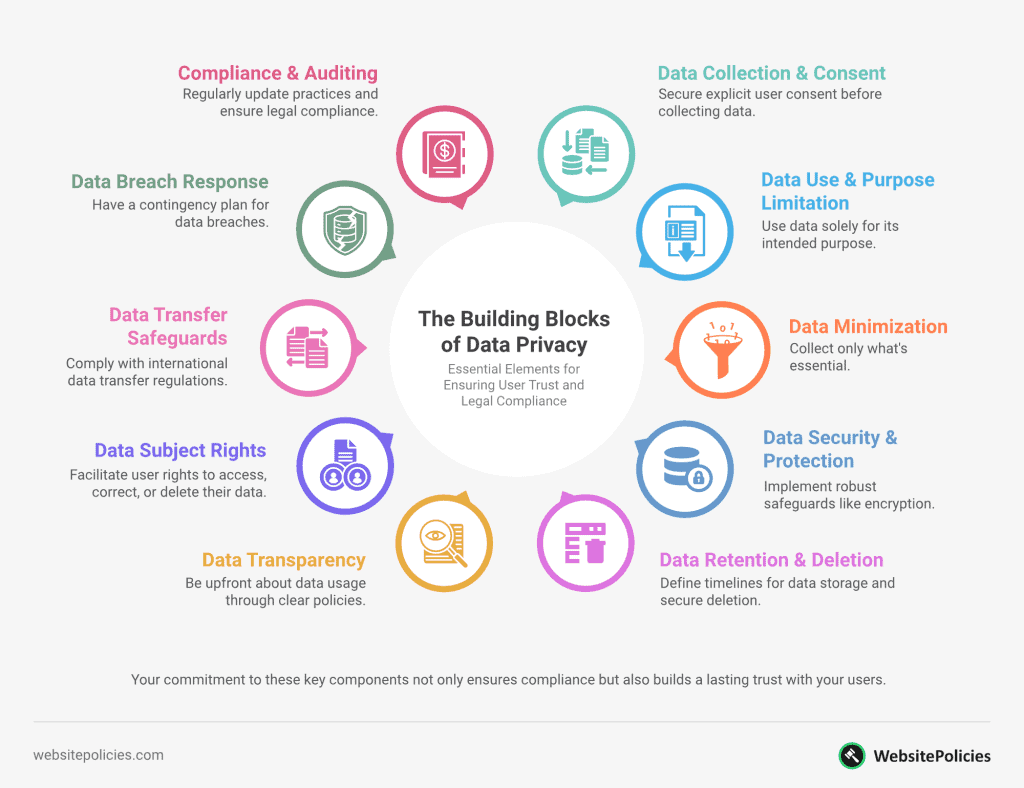Let’s break down “what is data privacy” in simple terms — it’s how you look after the personal details your users share online.
Think of it as a trust pact. When users visit your site, they’re handing over pieces of their private life, trusting you’ll keep it safe. Data privacy matters because it’s all about keeping that trust unbroken.
It’s not just about following the law but also showing your users you value their privacy as much as they do. If you get data privacy correctly, you earn respect and loyalty. That’s why it’s essential as it boosts your reputation and sales.
This guide will help you understand how to do that by following the rules and making sure your users’ data stays protected. Let’s dive right into it.
- Data privacy means managing personal data with respect for user rights while meeting your business objectives.
- Get ahead of the competition by respecting user data rights through transparent and ethical privacy practices.
- Regularly update privacy strategies to manage evolving cyber threats and maintain robust data protection.
Table of Contents
PRO TIP: Take the hassle of writing your own privacy policy away with our privacy policy generator trusted by over 200,000 businesses. It’ll save you hours of work and possible costly legal mistakes.
What Is Data Privacy?
Data privacy refers to the protection and management of personal information that is collected from users. It’s about ensuring that the data collected is handled in a way that respects the rights of individuals while also meeting business objectives.
For online entities, understanding data privacy is more than just a good practice — it’s a necessity. Regulatory landscapes are continually shifting, and non-compliance can result in hefty fines and damage to reputation. However, more than fear of penalties, maintaining strong data privacy is about building and maintaining trust with your users.
Another aspect to consider is third-party relationships. If you’re using external services or platforms to manage, store, or analyze data, it’s your responsibility to ensure they uphold the same standards you do.
Regularly updating and revising data privacy practices is vital. The digital landscape is dynamic, with new threats and challenges emerging often. Staying proactive, rather than reactive, is key to ensuring your data practices remain robust and in line with best practices.
PRO TIP: I’ve observed that businesses that prioritize data privacy often enjoy a competitive advantage. When users know that their information is in safe hands, they’re more likely to engage, convert, and become loyal customers.
Data Privacy Is Not Data Security
Data privacy and data security, while closely related, serve distinct purposes and carry unique implications for online businesses.
Data privacy focuses on the rights and expectations of individuals regarding their personal information. It’s about ensuring that data is collected, processed, and shared in a manner that respects individual rights.
This includes considerations like obtaining proper consent before collecting data, being transparent about how data will be used, and giving users the option to opt out or have their data deleted.
Essentially, data privacy is centered on the “why”, “how”, and “who” of data collection and use.
On the other hand, data security deals primarily with the protection of data from malicious threats and breaches. It’s about the mechanisms and protocols you have in place to safeguard data from unauthorized access, leaks, or theft.
Data security looks at the “how” from a different angle, focusing on the tools, technologies, and measures that ensure data remains confidential and intact. It’s the digital locks, guards, and walls that keep intruders out.
While data privacy might dictate that a user has the right to request their data be deleted, data security ensures that, during its lifecycle, this data is safely stored, encrypted, and shielded from cyber-attacks.
Think of the relationship between the two like a house. Imagine data privacy as the rules you set for your home – who’s allowed in, what they can do, and how long they can stay. Meanwhile, data security is the quality of locks on your doors, the strength of your windows, and the reliability of your alarm system.
Understanding this difference is important. Even if you invest heavily in data security, which is essential, you may overlook the equally important aspect of data privacy.
Data privacy compliance is not just about keeping data safe; it’s about using it responsibly and transparently. Neglecting data privacy can lead to legal consequences, loss of trust, and damage to your reputation.
Why Is Data Privacy Important?
Data privacy holds paramount importance for several compelling reasons, especially in the contemporary digital landscape where information is a highly prized asset.
Firstly, trust is the foundation of any successful online relationship. When users share their personal data with you, they’re extending trust. Respecting and protecting their data underscores your commitment to honoring that trust. Failures in this case can lead to a significant erosion of trust, tarnishing your reputation and negatively impacting your bottom line.
Secondly, the regulatory landscape is becoming increasingly stringent. Global regulations, such as the General Data Protection Regulation (GDPR) in Europe and the California Consumer Privacy Act (CCPA) in the U.S., impose strict guidelines on data collection, processing, and sharing. Non-compliance can lead to severe financial penalties, legal ramifications, and a damaged public image.
Another reason to consider is the competitive advantage. As consumers become more educated about data rights, businesses that champion privacy are often viewed more favorably, differentiating themselves in crowded marketplaces. Offering transparent data practices can become a unique selling proposition, attracting and retaining discerning users.
Lastly, with the rise of advanced technologies such as AI and machine learning, the potential for data misuse grows. Ensuring robust data privacy practices means that even as you harness the power of these technologies, you remain committed to using data ethically and responsibly.
PRO TIP: When done right, data privacy is not a burden but an asset, one that can set your business apart in an increasingly data-conscious world.
Key Components of Data Privacy
Now, let’s take a closer look at the key components of data privacy. These are the building blocks of a strong data privacy strategy.
They not only keep you in line with legal standards but also show your commitment to respecting individuals and their personal information.

Data Collection and Consent
This is the starting point for any responsible data-handling process. It’s gathering data and doing it within the boundaries of the law and with the explicit consent of the individuals involved.
Respecting their choices regarding what data they are comfortable sharing is both a legal requirement and an act of respect. It sets the stage for a transparent and ethical data relationship, where trust is built from the very beginning.
Data Use and Purpose Limitation
Once data is in your possession, using it exclusively for its intended purpose is a key element of data privacy. Straying from the initial reason for collecting it not only undermines trust but can also result in legal consequences.
If you collected data for a specific service or transaction, using it for marketing without proper consent is a breach of trust and privacy.
Data Minimization
The principle of data minimization encourages collecting only what’s truly necessary for your operations. You should avoid the unnecessary hoarding of data, which not only increases privacy risks but also adds unnecessary complexities to data management.
PRO TIP: In essence, less data means less potential for misuse or breaches.
Data Security and Protection
Protecting data is no different than protecting any other valuable asset. It should be treated with the utmost care. Implementing robust safeguards like encryption, access controls, and regular security audits is a non-negotiable practice.
It’s like fortifying your digital castle against potential intruders, so you can ensure that data remains confidential and secure.
Data Retention and Deletion
Defining clear timelines for how long data is retained is essential. Once data has served its purpose and is no longer needed, it should be systematically and securely deleted.
This practice not only minimizes privacy risks but also simplifies your compliance with data protection. The less data you have in storage, the less you need to protect.
Data Transparency
Transparency is the foundation of trust in data relationships. Being upfront and clear about how data is used is essential.
Crafting clear, concise privacy policies and statements that individuals can easily understand is a fundamental component as it helps individuals make informed choices about sharing their data.
Data Subject Rights
Individuals have rights over their data, and it’s important to respect and facilitate those rights. This includes the right to access their data, correct inaccuracies, and even have it deleted as per applicable regulations.
More than a legal obligation, it acknowledges the individual’s ownership and control over their data.
Data Transfer Safeguards
In a highly connected world, data often crosses borders, and ensuring that it remains protected when it does is essential.
Complying with international data transfer regulations, like the GDPR’s requirements for data transfers outside the European Economic Area, ensures that data privacy is maintained, regardless of its physical location.
Data Breach Response
Recognizing that no system is 100% secure, having a well-thought-out plan for responding to data breaches is necessary.
This plan should include notifying affected parties promptly, taking corrective actions, and mitigating potential harm. How you handle a breach can largely impact your reputation and compliance status.
Compliance and Auditing
Staying current with evolving privacy laws and regularly auditing and updating your data privacy practices is a proactive step. It ensures that your organization stays within legal boundaries and can adapt to changing regulatory landscapes.
With compliance and auditing, you meet legal requirements and demonstrate a commitment to ethical data handling and respecting individual privacy.
Laws That Govern Data Privacy
You need to understand the laws that govern data privacy as they shape the way personal information is collected, used, and protected. Here are the key legal frameworks that set the stage for protecting sensitive data and respecting individual privacy.
Data Privacy in Europe
The General Data Protection Regulation (GDPR) certainly upped the ante when it kicked in back in 2018. Acting as a robust shield for personal data, this law doesn’t just protect European citizens. Anyone conducting business within the European Union falls under its umbrella.
GDPR comes with a firm set of guidelines around how you collect, use, and safeguard information. And believe me, it’s not a regulation you want to shrug off. Failing to comply can lead to hefty fines highlighting just how seriously data privacy is taken.
Running parallel to the GDPR, we’ve got the ePrivacy Directive. This piece of legislation zooms in on the digital world, specifically electronic communications. It mandates obtaining consent for online tracking activities and the use of cookies, pushing the envelope further in enhancing online user privacy.
With these two key regulations, data privacy in Europe is pretty well-covered. It’s a strong reminder that whether you’re dealing with customer data or employee information, privacy should always be at the forefront.
Data Privacy in the US
The California Consumer Privacy Act (CCPA), which came out in 2020, is a landmark move in reinforcing data privacy on American soil. It’s like giving Californians a brand-new superpower to control their personal information.
Under this law, they can request details about their data — what’s being collected, how it’s being used—and even demand its deletion. Moreover, they can choose to opt out of having their data sold.
Then we have the Children’s Online Privacy Protection Act (COPPA). Designed with the under-13s in mind, it’s like a digital safety net for our youngest netizens. Parents can breathe easier knowing that COPPA requires their consent before any data collection from their young ones can occur.
In summary, just like Europe, the U.S. is undergoing a shift towards more comprehensive data privacy regulations, albeit in a state-by-state manner.
Other Data Privacy Laws
Up north Canada, the Personal Information Protection and Electronic Documents Act (PIPEDA) is paving the way for data privacy. Echoing the GDPR, PIPEDA is all about safeguarding individual data. It sets out clear norms for organizations about how to handle personal data, endorsing transparency, consent, and security.
In Africa, South Africa’s Protection of Personal Information Act (POPIA) came into force in 2021. It shares a few things with the GDPR and throws the spotlight on data protection. It clarifies the rights of those whose data is at stake and the duties of those who handle it.
Singapore is home to the Personal Data Protection Act (PDPA). Designed as a guard against privacy breaches, PDPA oversees the collection, use, and disclosure of personal data. It ensures that individuals steer the ship when it comes to their data.
Every corner of the globe has its unique laws, but the common thread is clear: data privacy is essential. No matter your location, safeguarding personal data is a global responsibility.
It’s proof of the universal importance of data privacy in our interconnected world. It’s about recognizing the value of privacy and respecting it, a principle that transcends borders and time zones.
So, if you are operating across borders or catering to international audiences, consider understanding and complying with these laws where applicable. Data privacy isn’t confined by geographic boundaries; it’s a worldwide concern.
Considerations for Certain Data Types
Some information is more sensitive and personal than others, such as medical records, financial data, and biometric information. Protecting this data demands a heightened sense of responsibility, as the consequences of mishandling can be severe, both legally and in terms of reputation.
When dealing with sensitive data, extra layers of protection are essential. Encryption is your best friend here. It scrambles data, making it unreadable to unauthorized parties. Access controls and authentication are important to ensure that only authorized personnel can access this information.
PRO TIP: To reduce the risk, only collect what’s absolutely necessary. If you don’t have certain sensitive data, you can’t lose or mishandle it. Data minimization is a proactive step in data privacy.
Now, if you are collecting sensitive data, transparency, and informed consent are necessary. Individuals should know exactly what data you’re collecting, why you need it, and how you plan to use it.
Also, you should define clear timelines for retaining sensitive data. Once it’s no longer needed for the intended purpose, it should be securely deleted. Storing it indefinitely increases the risk of breaches.
More importantly, regular security audits and vulnerability assessments are non-negotiable when handling sensitive data. Being proactive in identifying and addressing potential security flaws is critical to ensuring that your data remains protected.
Common Data Privacy Challenges for Businesses
One significant obstacle is the ever-changing landscape of data privacy regulations. Different regions and countries introduce their own sets of rules, making it a maze for businesses that operate globally. Staying compliant requires constant monitoring and adaptation, often straining resources.
Coupled with regulatory navigation is the technical aspect. Businesses use a variety of platforms and tools, leading to fragmented data storage. Ensuring consistent protection across these platforms is no easy task.
Moreover, as cybersecurity threats become more sophisticated, businesses need to be a step ahead to prevent potential breaches.
A subtler, yet critical challenge is balancing user demands.
On one hand, consumers want personalized experiences, requiring businesses to collect and analyze data. On the other, they’re increasingly conscious of their digital footprints and demand robust data protection. Striking the right balance between personalization and privacy is a delicate act.
Lastly, businesses face internal challenges. Ensuring that every team member understands the importance of data privacy and follows best practices is essential. Human errors or oversights, often unintentional, can lead to significant data breaches.
PRO TIP: While they can be complex, data privacy challenges are manageable with the right strategies and a commitment to prioritizing data privacy as a core value of your business.
Data Privacy Best Practices
If you’re keen on complying with regulations (as you should) and creating a bond of trust with your customers, here are some of the best data privacy practices to consider for your business.
They are a step toward establishing a culture of respect for data privacy within your online business. This, in turn, can boost your reputation and customer trust.
- Data Minimization: Only collect necessary data.
- Transparency: Maintain a clear privacy policy and communicate data practices.
- Consent Management: Ensure clear consent mechanisms and allow for updates or revocation.
- Data Encryption: Use strong encryption methods to protect data during storage and transfer.
- Regular Audits: Periodically review and assess data handling and storage practices.
- Employee Training: Ensure that all staff are educated about data privacy regulations and best practices.
- Secure Third-Party Relationships: Ensure third-party services adhere to your privacy standards.
- Incident Response Plan: Have a clear plan in place for potential data breaches or privacy incidents.
- User Control: Allow users to access, modify, and delete their data as needed.
- Stay Updated: Continuously monitor changes in privacy regulations and update practices accordingly.
Frequently Asked Questions
What is data privacy?
Data privacy safeguards personal information and emphasizes legal and ethical handling while respecting data protection rules.
Why is data privacy important?
Data privacy is important as it respects individual rights and helps businesses comply with laws, creating trust with customers and building a competitive edge.
How does data privacy differ from data security?
Data security protects against unauthorized access, while data privacy focuses on responsible and ethical data handling.
What are the key components of data privacy?
Key components include data or information collection, consent, use, minimization, security, retention, transparency, data subject rights, transfer safeguards, and breach response.
What are the common data privacy challenges for businesses?
Businesses often face challenges like data security, compliance complexity, data collection, minimization, retention, employee training, third-party risks, and data subject rights.
What should I consider when handling sensitive data?
Use encryption, access controls, informed consent, and delete data when no longer needed to protect sensitive info.



